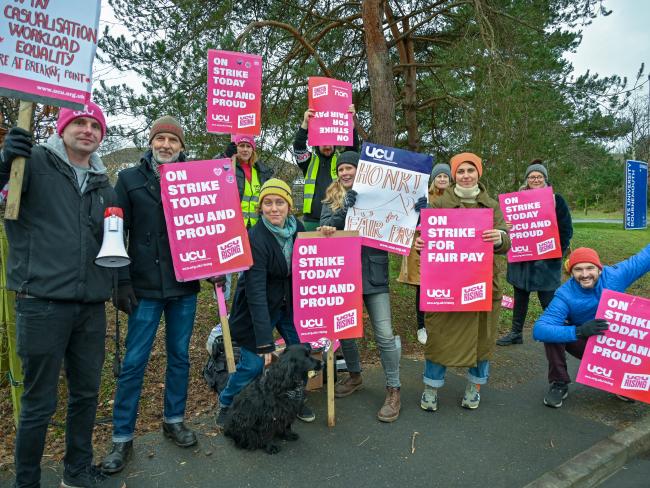24 August 2023

UCU members at Arts University Bournemouth on strike February 2023. Photo Ajit Wick / Shutterstock.
The University and College Union (UCU) has announced it will take more strike action before the end of September unless the employers agree to return to negotiations and end the disruption to degree awards.
The union is deliberating on its response in the face of intransigence by the Universities and Colleges Employers Association (UCEA). UCU’s Higher Education Committee met on 14 August. As well as voting for further strike action, it decided to begin preparations for a new ballot to renew UCU’s industrial mandate in the pay and conditions dispute.
Inadequate
UCU members have overwhelmingly rejected a 5 per cent pay offer as inadequate. There are over 90,000 university staff on insecure contracts. And staff work an average of two extra days unpaid per week.
The marking and assessment boycott will also continue. It began at 145 universities on 20 April. UCEA refused not only to improve its offer but even to meet the union. And individual university employers have punitively docked the pay of staff taking part in the action.
The National Union of Students, and many of UCEA’s own member institutions such as the University of Cambridge and the University of Sussex, have called on UCEA to settle the dispute.
Surplus
UCU says that the university sector generated more money than ever last year, yet the proportion going to staff fell to a record low. The surplus generated could be used to raise pay by 10 per cent, employ properly those on temporary contracts and address work overload and pay inequality (all demands of the union’s broader “Four Fights”). And that would still leave hundreds of millions of pounds spare.
“We will not be bullied into accepting gig economy universities.”
UCU general secretary Jo Grady said: “We will not be bullied into accepting gig economy universities, nor will we accept employers imposing punitive pay deductions.”
Grady pointed out that the union has agreed to a joint review of finances, but employers have made no attempt to compromise on the key issues and have shown no goodwill at all.
Scandal
Grady blamed university bosses for the impact on students. “Vice chancellors have decided that crushing their own workers is more important than seeing students graduate after years of hard work. This is a national scandal,” she said.
Even the UK government, no doubt responding to public demand, calls for a negotiated settlement. UCU has welcomed the intervention as it has been calling for further negotiations for months.
The union believes that UCEA is only now calling for a joint review of sector finances so that the overwhelming number of rich universities can plead poverty on the back of the few who are in trouble financially.
Standards
University managements have tried to use precariously employed staff to break the marking and assessment boycott. Where that has failed, they’ve undermined standards by allowing unmarked work to be graded on the basis of work marked pre-boycott. They have encouraged the dropping of the normally rigorous double marking and moderating standards.
The Russell Group of universities is now offering more places on courses to international students than to British students. Undergraduate fees have been capped at £9,250 for domestic students since 2017, whereas there is no limit on fees for international students.
Public good
The way the university sector is now run has little relation to quality research and teaching, or to the public good. It is the staff who maintain standards. As UCU’s general secretary says: “We are fighting not only for fair pay and conditions, but for universities that serve staff, students, and the public good. Employers are disgracing themselves and undermining the entire sector.”
• University employers are holding out on pay for non-academic staff too – technicians, cleaners and so on. Pay awards of 5 to 6 per cent were imposed this year after just 3 per cent last year. Around 1,000 Unite members at five Scottish universities have voted to take strike action in response, part of the wider dispute on higher education pay.
